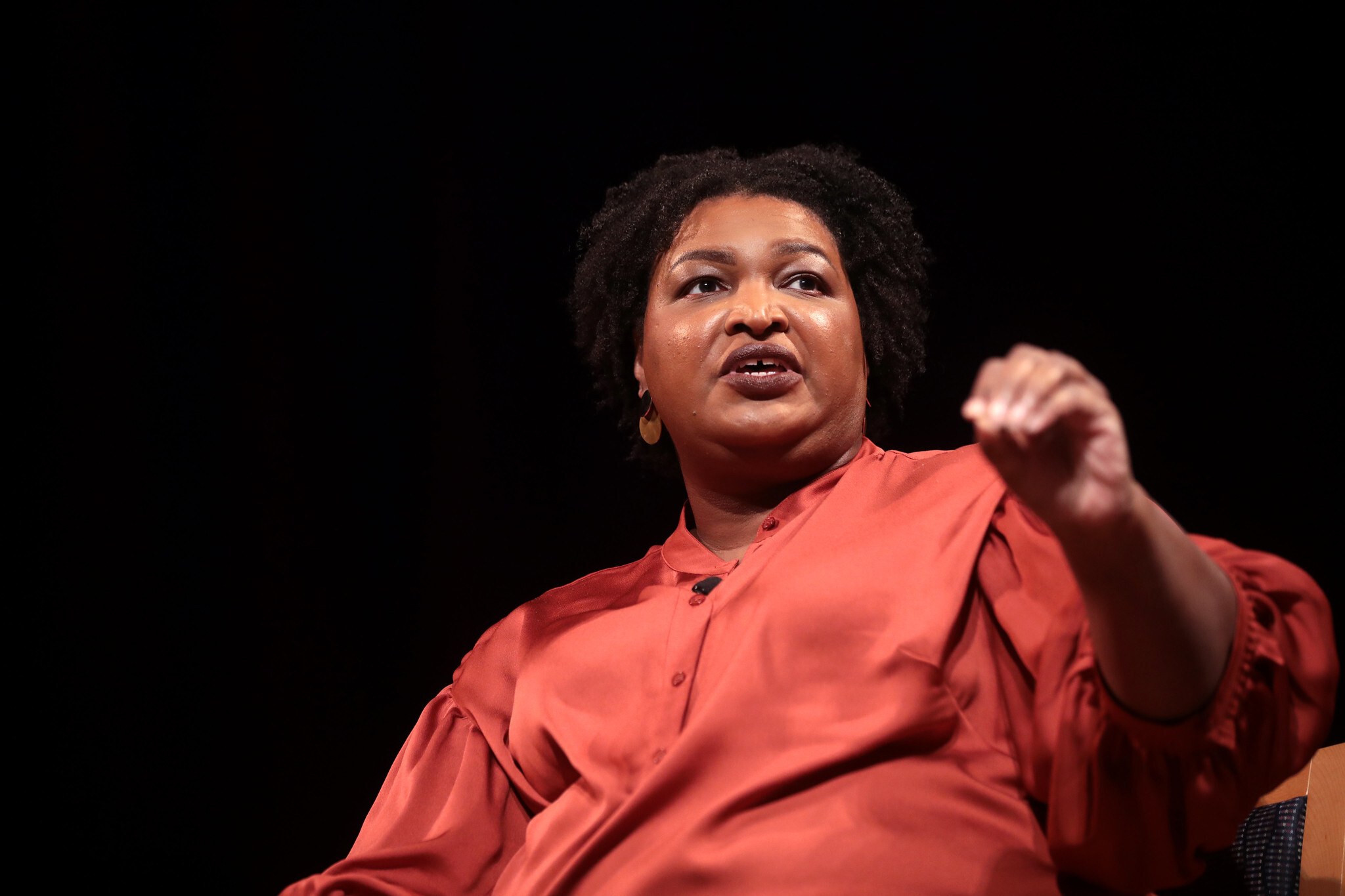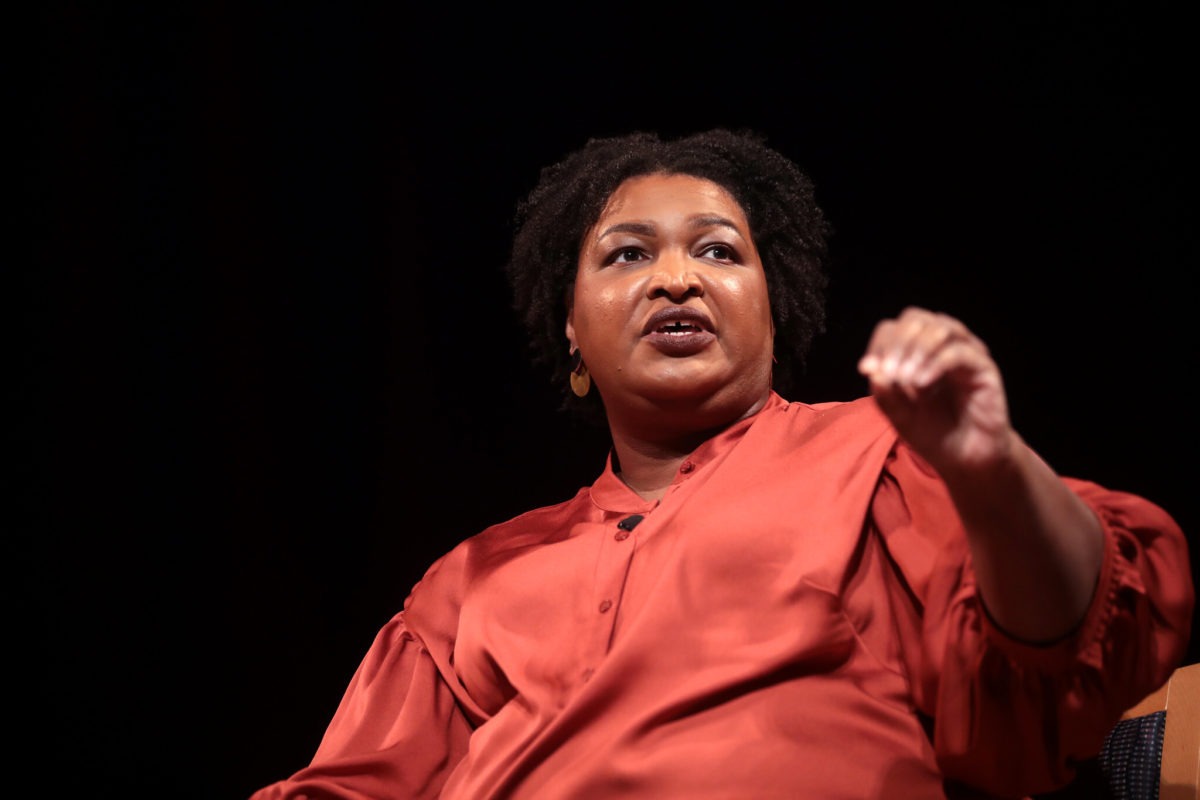Newsletter
Stacey Abrams’ Bold New Idea is to Tack to the Center
Stacey Abrams wants to give police officers raises. Time and again, Democrats have reacted to calls for racial justice by giving more money to cops.


Stacey Abrams’ Bold New Idea is to Tack to the Center
by Nneka Ewulonu
In June 2020, then-Vice Presidential hopeful Stacey Abrams appeared on ABC’s “This Week” to respond to Atlanta Police Officer Garrett Rolfe’s murder of 27-year-old Rayshard Brooks. As protesters chanted in Georgia streets, demanding justice for both Brooks and George Floyd, Abrams said the protesters had a point.
“There is a legitimacy to this anger,” she said. “There is a legitimacy to this outrage. A man was murdered because he was asleep in a drive-through. And we know this is not an isolated occurrence.”
But now, two years later, Abrams is running for Georgia governor—and wants to give those same police officers raises.
On June 23, 2022, Abrams outlined her law enforcement platform in a series of tweets. The thread starts by stating that police officers in Georgia do not make a living wage and that Georgia “must” raise their pay. As of July 2022, the starting salary for an Atlanta police officer is $48,500—approximately $23 an hour, significantly more than the estimated $18.37 living wage for a single person in the Atlanta metro area. Atlanta PD does not require a college degree to be an officer, yet offers a salary that is nearly double the $27,915 average salary for a Georgian with a high school diploma or GED. To make matters worse, this appeared to be the first time she had ever tweeted the phrase “living wage.”
Police salaries keep growing. But American policing is broken. Our police kill more people than the law enforcement agents of all other Global North nations. A 2019 study published by the National Academy of Sciences found that Black men are approximately 2.5 times more likely than white men to be killed by police, while Indigenous women are up to 2.1 times more likely than white women to be killed by police. An estimated 40 percent of law enforcement families experience domestic abuse. And as we saw recently, some cops would rather stand around while children are shot to death than muster the courage to enter an unlocked classroom.
But instead of recognizing these failures, Abrams’ policy proposals represent another instance of the Democratic Party folding in the face of an all-too-predictable Republican and police backlash to 2020’s anti-police-brutality uprisings.
One element of Abrams’ plan includes “[p]rovid[ing] grants to localities to support increased salary for local law enforcement.” In 2020, law enforcement’s national clearance rate for murder hit a historic low of 50 percent, while the clearance rate for rape also hit a low of 30 percent. Atlanta cops spent an average of $950,000 settling misconduct claims between 2015 and 2020.
What increased funding to law enforcement does seem to reliably accomplish is an increase in misdemeanor arrests rather than improvements to crime rates or public safety. Worse yet, an increase in a city’s Black population is correlated with that city increasing its budget for law enforcement.
Abrams claims specifically that officer raises “will lead to better officer recruitment, better officer retention, better community interactions and a safer Georgia.” But there’s almost no other profession where you can be objectively bad at your job and still be rewarded with a raise.
Abrams’ policy also includes “[i]nvest[ing] in expanded training.” At first glance, this policy has merit: American law enforcement spends an average of 21 weeks in training before going on patrol, almost half the amount of training done by Canadian police and a tenth the training of Finnish police. American cops spend an average of 168 hours on firearms, self-defense, and use of force training, compared to only 9 hours on mediation and conflict management skills. These trainings do little other than prepare police for violence—especially when departments sometimes use paper targets of Black men during shooting practice.
But improved training isn’t the quick fix many Democrats like Abrams seem to think it is. A 2020 study on the impact of the New York Police Department’s mandatory implicit bias training found that while cops said the training changed their personal perspectives on race, the lessons had little to no impact on how these officers engaged with the public. The NYPD continued to overpolice Black and Hispanic residents at nearly the same rates.
What is clear, however, is that Democrats have reacted to calls for racial justice and an end to police brutality — featuring potentially the largest social justice movement in American history — by giving more money to cops. When these funding increases come from the pockets of Democrats in Georgia, it’s a betrayal not only of our history as leaders in civil rights movements, but to the state’s new position as a purple political battleground.
The groundswell of Georgian Democrats that elected the first two Democratic senators in the state since 2000 deserve acknowledgement. Instead, under Abrams’ proposals, the only people winning anything would be her opponents.
In the news
According to an In These Times investigation, at least 115 people convicted of minor traffic charges or misdemeanors in Clayton, Georgia, in 2018 received probation sentences of a year or more. [Nick Barber / In These Times]
The criminalization of homelessness has pushed unhoused people in Lancaster, California, to live in the desert, where they try to survive “blazing hot temperatures in the summer, snow in winter, rugged terrain inaccessible to many vehicles, a constant wind that blankets everything with silt, and no running water for miles.” [Sam Levin / The Guardian]
Students are organizing to get cops out of schools, and school boards are key to their fight. [Desiree Rodriguez / Truthout]
The new San Francisco District Attorney, Brooke Jenkins, has fired 15 people, most of them hired by her predecessor Chesa Boudin. “There is no question that DA Jenkins’s approach differs dramatically from my values,” one fired staffer told Tana Ganeva. [Tana Ganeva / The Intercept]
So-called bite mark evidence is the epitome of junk science, but it still keeps people locked up. [Jason Flom / Wrongful Conviction]
ICYMI — from The Appeal
At least 60,000 people aged 50 or older are released from U.S. prisons each year, and as Hope Corrigan reports, the challenges formerly incarcerated people face in securing eldercare leave many with nowhere to turn.
Meg O’Connor spoke with WNYC’s Brian Lehrer about the Department of Justice’s investigation into the NYPD’s Special Victims Division, raising the question as to whether sex crimes should be handled by police at all.
Bryce Covert reports on the challenges of uplifting positive outcomes from bail reforms, how the lack of positive coverage plays a role in the backlash movement, and why media is so fixated on negative bail reform coverage.
That’s all for this week. Feel free to leave us some feedback, and if you want to invest in the future of The Appeal, please donate to our anniversary campaign here.
From now until Friday, if you make a one-time donation of just $40, you can get a limited edition “Fire Your Bosses, Read The Appeal” T-Shirt.
